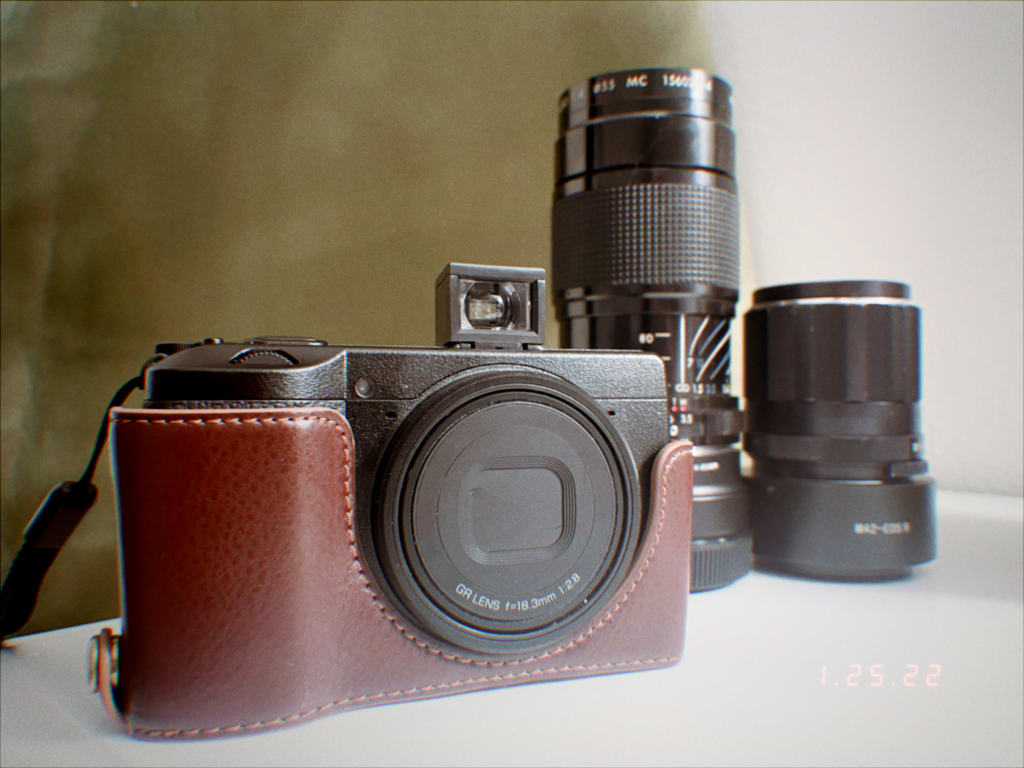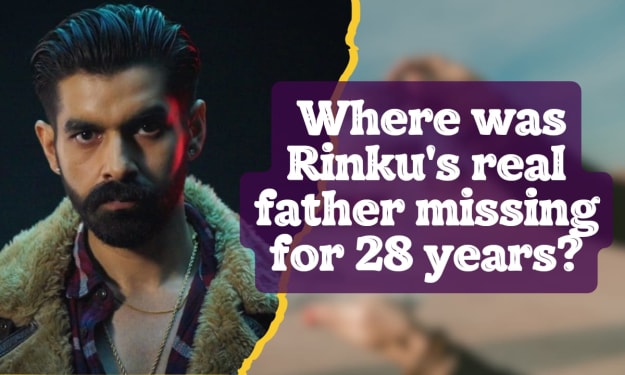6 Questions To Ask Yourself When Picking Out Your First “Real” Camera.
Let's cut the camera crap, not all gear is the same AND you don't have to break the bank to get into photography. I've picked out my top 6 things I wish I knew before buying my first camera.

---
My first camera was a Nikon, and then a Canon, and then a return to Nikon, and then a Sony, and then another Sony, and back to Canon and then I added another Canon, and lastly I've recently picked up a Ricoh. So, safe to say, I've dabbled in all of the major brands (excluding Fuji) and experienced a bit of wishy-washy switches and swaps between bodies and brands. Along the way, I made some mistakes, maybe you won't have to.
- Can you grow with this?
- Do you have friends who use the same brand?
- What do your favorite photography accounts use?
- In what conditions and environments will you be using this?
- What mount does the camera use?
- Is resale value important to you?
Can you grow with this? Does this camera have qualities that sorta future proof the body for you for at least the next 2 years? I say two years because most photographers either grow a ton or quit all together in the first two years. My first camera was a Nikon Coolpix, which is by no means a professional camera, or even a DSLR, but it scratched the itch at the time (when I bought a $400 brand new camera for $130 during a Radioshack closing sale). This would hold me over till I bought my first "real" camera, a Canon T6 (also brand new, via an amazon bundle sale). Looking back, for the time, the crop sensor T6 was really a perfect intro camera and I had it for about 1.5 years before I upgraded. I went back to Nikon by way of the full frame sensor Nikon D610. The D610 was my first purchase that wasn't technically "brand new" and I saved a few hundred dollars by buying it via ebay as an "open box" return item. Even though I would say the Nikon D610 was my first "professional" camera, the time I spent on the Canon T6 was invaluable as a learning tool. Not only was it a capable platform, and used the ubiquitous Canon EF mount, it was also a camera that forced me to learn the limits of my camera. A supreme learning tool, though today, I think it's quickly becoming outdated and easily outpaced by a competitively priced Sony A6000.
Do you have friends who use the same brand? This only matters if you have good friends who already do photography, and I guess… only if you have good friends…or friends. Anyways. If you have these rare good friends who do photography, and they're nice enough to trust the newbie with their lenses and gear, if you buy a camera of the same brand/system as them, then you can try out a variety of products to see what you like. As it stands, my two best photographer friends shoot on Nikon and Fuji bodies and I shoot on Canon. We have at different times all shot Canon or Nikon bodies, but oddly never at the same time. What we DO share though is a fascination with vintage M42 mount (a 'retro" Pentax mount) lenses and can share those with our respective adapters. However, it would be cool if I could try out my buddy's Nikon150–600mm wildlife lens, alas not with my Canon. Point being, consider if you'll have compatibility issues with your cohort. This extends to just basic troubleshooting and photo editing tactics (sense all camera brands render photos and colors slightly differently). It's nice if your Fuji friends can let you know that your Fuji photos will naturally bias toward blues/greens and that you're not going crazy.
What do your favorite photography accounts use? This might be a little harder to pinpoint in advance. Your favorite accounts might not disclose this info publically. You might (probably) not have fallen down the photography rabbit hole yet and are just trying to get your feet wet. So it's understandable if you don't know what EXACTLY it is you're looking to create or recreate in your style. Having used all of the major brands (excluding Fuji) I can say I definitely prefer the way that Canon renders their photos. I can't immediately discount Nikon or Sony either though. In fact my favorite entry level camera to recommend is the Sony A6000 that I mentioned earlier. If Canon offered a comparatively priced entry level mirrorless camera though I'd probably recommend that though (seriously Canon, get on it, Sony is KILLING that market that used to belong to the T series Canon DSLRs). In full seriousness I would actually recommend you spend a few hours scrolling through Instagram to figure out what your favorite photos are INSTEAD of spending that time reading reviews and comparisons on photo websites or blogs (or, uhm, I mean, keep reading mine though, mine is different, haha, totally). At this point in your shopping experience you probably don't REALLY know what you're reading in a review and it's probably just more expedient to look at the product of other photographers' work to judge what you like most.
In what conditions and environments will you be using this? This is short and simple. Buy the gear that can withstand your usage and life. Are you rough on your gear? Live in a dusty or rainy environment? Live in a high crime or theft area? Buy the gear that can survive your life. This tip comes more from my perspective as a professional conflict journalist than as a casual photographer. I want my gear to survive rainy nights at a protest in Portland, OR , just as much as it should survive a dusty bullet-riddled street in Iraq. This means I buy expensive weather-sealed professional Canon cameras. I'd say Nikon's DSLRs would be a close second for this usage (with Sony and Fuji very far behind). However, when I was a broke college student, I couldn't afford to have my professional camera stolen on a sketchy street corner in my home city of Atlanta GA. So I made sure to buy stuff that I could afford to replace. This factored into my initial purchase of the Canon T6. Nowadays, this mindset still factors into my life, but now in the form of a daily question: "Do I take the $2500 R6 or the $4000 R5 to this event/shoot?". If you can't tell, I tend to take my R6 into the rougher jobs. Buy what you can afford to lose, but try and buy something that can keep up with your life too.
What mount does the camera use? This will probably be overlooked by the first-time buyer. Your "mount" is a locking mechanism that holds the camera lens to the camera body. For the most part, camera brands don't use the same mounts so a Canon lens won't work on a Nikon body, and vice versa. Mounts are also specific to certain camera systems, so even within the Canon ecosystems you might find that certain Canon lenses won't work with certain Canon bodies. This can be frustrating a few months down the road when you try to upgrade to a new lens OR to a new camera body and find out your old lenses won't work with your new body.
At the time of writing this I will place the following mount specific warnings
The Canon EF-M mount is effectively "dead" and won't be supported in the future. This is a shame because the recent M50 and M6 are actually great entry level cameras BUT are dead ends as far as lenses and support go.
The Canon EF (no "-M") DSLR mount is still a great mount but will eventually face the same fate as the EF-M mount due to the new RF mount found on Canon mirrorless cameras. EF-to-RF adapters are sold by Canon and I use them for a few lenses with no issue. This means that you can safely buy a newer RF camera and get away with using less expensive BUT high quality EF lenses.
The Nikon AF mount is timeless but has been replaced by the Nikon Z mount for their newer mirrorless cameras. I understand that the Z mount lenses are fantastic, but so were the AF mount lenses. You can't really go wrong with either mount right now, BUT I'd personally try and future proof myself and stick to the newer Z mount lenses. This stands in contrast to what I recommend with the Canon lenses because the adapter results on the Nikon cameras are less than optimal.
The Sony E-mount is used across all contemporary Sony cameras and has no indication of leaving anytime soon. Probably the easiest mounts to get into as a newbie.
Is resale value important to you? If so, buy a used model that's a few years old. Sorta like cars, a brand new camera will see a hit to resale value very early. However, after about 2–5 years the depreciation curve seems to level out on popular models. For example, the Sony A6000 has sold for about $300–400 for a few years now, and has actually seen a recent uptick in pricing. I bought mine in 2020 for $360, and sold it for $360 in 2021. My friend Caroline just bought one for $400, and my other friend Carter has been searching for a sub-$450 in his area for a while now. Lenses will often hold their value even better though, routinely selling for barely less than new models. This trend in lens pricing can however be upended if a new mount comes along. As mentioned above, the EF-M mount lenses will soon tank in value as they fade into oblivion as a dead mount. If the EF mount lenses didn't adapt so well onto RF bodies, they would have seen a similar drop in pricing. However they seem "safe" from depreciation right now. Generally though you should view the camera as a depreciating asset and the lenses as a stable asset. Plan your purchases accordingly.
Hope this helps, and maybe gives you something new to think about during your shopping process. If you found it useful or have questions, let me know in the comments.
About the Creator
Elijah Aikens
Political Scientist by degree, photographer by accident. I like cats, cars, and cameras. I also know a little bit about airplanes and politics.






Comments
There are no comments for this story
Be the first to respond and start the conversation.